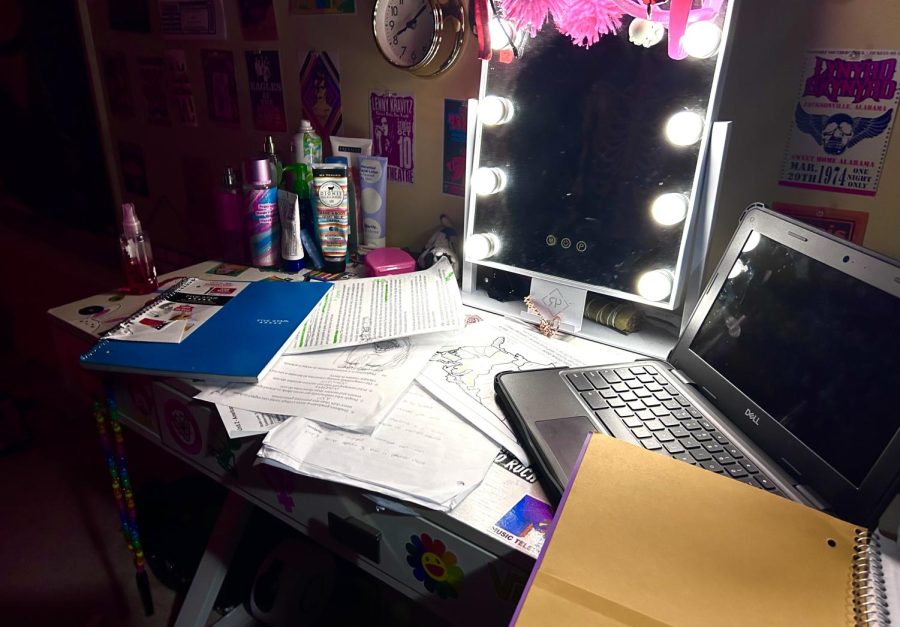Coping with anxiety while managing responsibilities
Photo By Elliot Krippelz
Many different assignments are piled up on a desk. Handling a lot of schoolwork can be an anxiety-inducing task for many students.
Having multiple assignments and tests to worry about at once can be overwhelming and anxiety-inducing. Not knowing where to start and having numerous upcoming deadlines can be extremely tricky to deal with, especially when trying to find motivation to do everything. Many students go through this struggle daily, but how are they able to maintain all of their varied responsibilities?
Being able to practice self-care while keeping up with schoolwork is something that can be challenging, especially with heavy workloads. Self-care is one of the most important things a student can do as a first step to easing anxiety surrounding schoolwork. Having a regulated sleep schedule, maintaining a proper diet and taking necessary breaks are all very important.
In an article from the Harvard Medical School about dealing with anxiety in college, Harvard MA Nicole J. LeBlanc talks about the importance of managing stress.
“Self-care behaviors are extremely important for regulating mood and helping people cope with stress,” LeBlanc said.
While establishing a self-care routine may be easier said than done, it is something that can be beneficial while dealing with school-related anxiety.
One of the biggest anxiety-related issues when it comes to schoolwork is finding motivation and figuring out where to start. It can be stressful not knowing exactly where to begin, which can lead to different loads of work piling up at the same time.
Anne Fein, an associate professor who teaches neurodivergent students and provides academic coaching, writes her article How to Foster Self-Motivation in High School using her coaching tactics.
“Focused work sessions tend to be productive when broken into three chunks within one hour: a 45-minute work session, a five-minute break that allows memory to begin consolidation and organization and a 10-minute review that supports attention,” Fein said.
Students tend to get caught up with so much going on at once, which can make doing the work not as productive as it could be. Allowing yourself to spend 45 minutes per subject with small breaks in between can make the workload seem less stressful. This is an organized approach to managing amounts of work and getting things done on time. Limiting yourself to 45 minutes or less is helpful to not get caught up in spending hours on the same subject. This can improve motivation and increase productivity.
Some students tend to put off their work until the very last minute because the workload can seem too overwhelming. This can build up anxiety and stress, causing the work to either not get done or have it be rushed. Being able to accept the amount of work that you have and approach it sooner rather than later can be the best option at times.
“We know that avoidance tends to make anxiety worse over time. Taking small steps to approach anxiety-provoking situations can be extremely helpful,” LeBlanc said.
Being able to communicate effectively with your teacher can also be helpful, which is something that many students tend to forget. Emailing or updating your teacher regularly about any confusion can be challenging but efficient to limit any stress about schoolwork. Approaching a teacher and being able to conference with them can be intimidating, however getting extra clarification can make students feel more confident about what to do.
Handling both personal and school-related issues can be tricky without any help. Students get so caught up with constant work that they tend to isolate themselves and not communicate with others about how they are feeling.
“School counselors are tasked with working with the whole student, not just academic, career or social / emotional development. It is crucial that students with anxiety learn positive coping techniques now to become healthy and productive citizens in the future,” said Landmark College counseling director Anna Duvall.
School counselors are very helpful to talk to, especially when you feel overwhelmed and don’t know what to do. Talking about academic or personal issues relieves anxiety in students, which can make their lives a lot easier.
Dealing with anxiety in school can be extremely discouraging, causing students to procrastinate, overwork themselves or even avoid all their required work. Using school resources and different work techniques can help prevent anxiety and allow students to manage their workload in easier ways.

Name: Elliot Krippelz
Position: Design Executive and Photography Executive
Graduation year: 2024
A few sentences...







